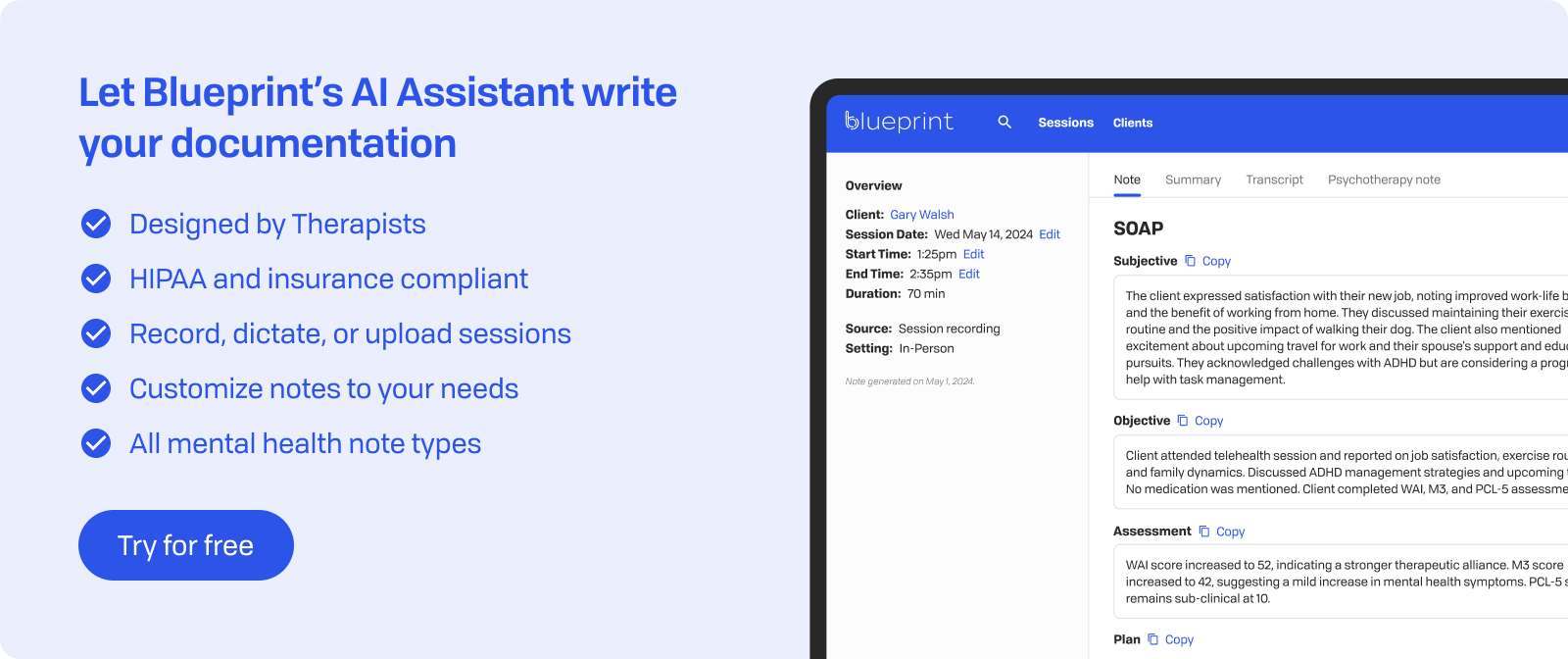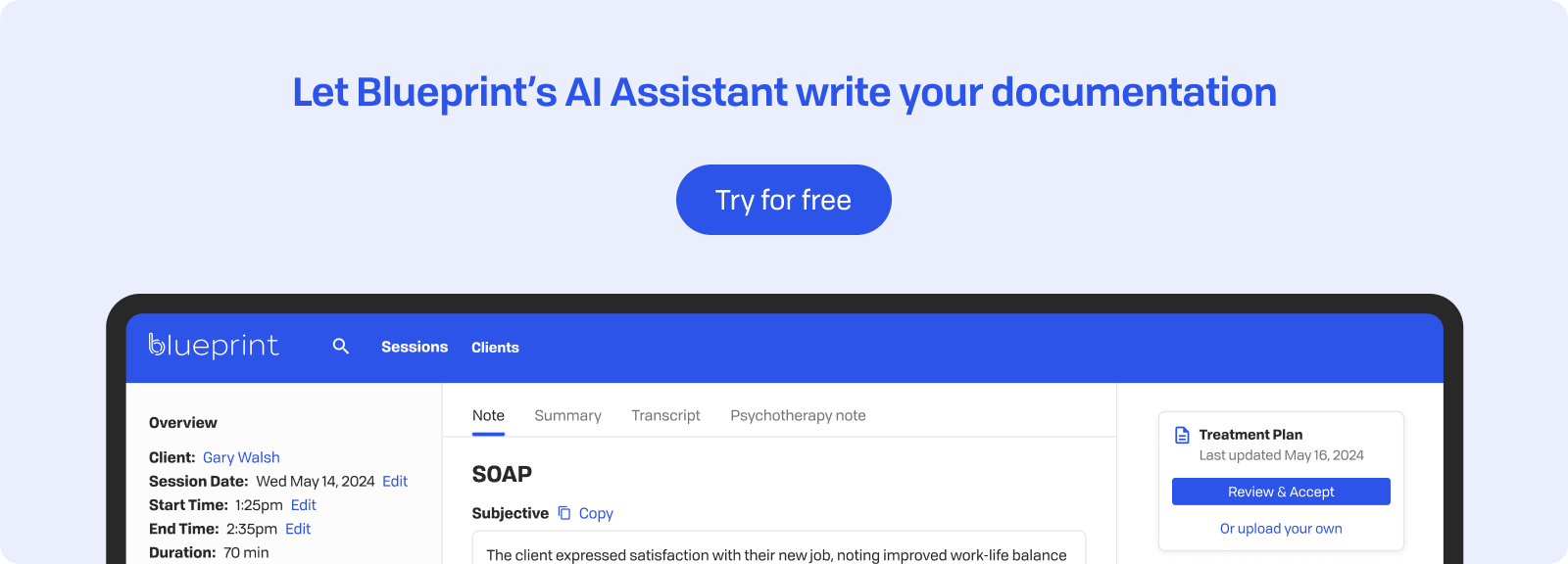In Brief
The mental health field includes a wide range of professionals, each offering unique training, expertise, and approaches to client care. Whether you're building referral networks, coordinating care, or figuring out where your practice fits in the broader landscape, knowing the differences between types of therapists is important.
This complexity can feel overwhelming, especially when clients ask about the differences between various credentials or when you're deciding if a particular case fits your scope of practice. The lines between different therapeutic roles aren't always clear, and the terminology can confuse both clinicians and clients.
These distinctions matter beyond professional curiosity. They directly affect the quality of care you provide, the effectiveness of your referrals, and your ability to collaborate within the mental health ecosystem.
Why Knowing Therapist Roles Matters for Clinicians
Knowing role differences improves collaboration and referrals across disciplines. When you know what a psychiatric nurse practitioner offers versus a clinical social worker, you make more informed referral decisions. This knowledge ensures clients receive the most appropriate care for their specific needs.
A clear understanding of different therapist roles helps clarify your own scope of practice and ethical boundaries. You'll better recognize when a client's needs go beyond your training and when consultation or referral is necessary. This awareness protects both you and your clients while maintaining professional integrity.
This knowledge also supports better interdisciplinary treatment planning and coordinated client care. When you work with a treatment team, understanding each member's expertise facilitates more effective communication and collaboration. You can make the most of each professional's strengths while avoiding redundancy or gaps in service delivery.

Core Licensed Therapist Categories
Knowing the main categories of licensed mental health providers helps you navigate the mental health field more effectively. Each type may share some similarities but offers distinct training, perspectives, and expertise to client care.
- Licensed Professional Counselors (LPC/LMHC): These professionals have broad training in diagnosing and treating various mental health concerns. LPCs work with individuals and groups across different settings such as schools, hospitals, and private practice. They often use evidence-based interventions like cognitive behavioral therapy to address conditions like anxiety, depression, life transitions, and stress management.
- Licensed Marriage and Family Therapists (LMFT): LMFTs focus on systemic and relational perspectives of therapy, viewing mental health through the lens of relationships and family dynamics. They're trained to work with individuals, couples, and families, addressing issues like communication patterns, relationship conflicts, and the influence of family systems on individual mental health. They specialize in understanding how relational factors affect psychological wellbeing.
- Licensed Clinical Social Workers (LCSW): LCSWs provide therapy to individuals, families, couples, and groups and are also trained in case management, advocacy, and systems-level interventions. They consider the broader social context affecting clients, including economic factors, community resources, and social justice issues. This comprehensive approach makes them particularly adept to working in a variety of organizations, including private practice, hospital settings, community mental health centers, and integrated care environments.
- Psychologists (PhD/PsyD): With doctoral-level training, psychologists provide advanced assessment, diagnosis, and psychotherapy. They are qualified to conduct psychological testing, use research-informed interventions, and often specialize in specific therapeutic modalities or populations. Their extensive training in research methodology allows them to conduct research and integrate the latest evidence into clinical practice.
- Psychiatrists (MD/DO): As medical doctors, psychiatrists most often provide pharmacological treatment, however, they are also trained to conduct psychotherapy sessions. They prescribe medications, monitor complex medication regimens, and address the biological aspects of mental health conditions while also providing therapeutic interventions.
Specialized Clinical Roles
Beyond the core licensed categories, many therapists pursue specialized training to serve specific populations or address particular mental health challenges. These specialized roles allow clinicians to develop deep expertise in focused areas of practice.
- Addiction Counselors: These specialists focus on substance use disorders, using evidence-based methods like motivational interviewing, cognitive behavioral therapy for addiction, and 12-step facilitation. They're trained in relapse prevention strategies, understanding the stages of change, and addressing co-occurring disorders. Many hold certifications like CADC (Certified Alcohol and Drug Counselor) in addition to their primary license.
- Child and Adolescent Therapists: Working across schools, hospitals, and private practice settings, these clinicians specialize in developmental psychology and age-appropriate interventions. They adapt therapeutic techniques for younger clients, incorporate play therapy, and navigate the complexities of working with parents and school systems. Their expertise includes understanding childhood disorders, developmental milestones, and family dynamics affecting youth mental health.
- Behavioral Therapists: Often focused on Applied Behavior Analysis (ABA) or cognitive-behavioral methods, these therapists work to modify specific behavior patterns. In educational settings, they create Behavior Intervention Plans, conduct Functional Behavior Assessments, and collaborate with teachers to support students with autism, ADHD, or behavioral challenges. They emphasize observable, measurable changes and systematic intervention strategies.
- Clinical Rehabilitation or Health Psychologists: These specialists address the psychological aspects of chronic illness, disability, and medical conditions. They help clients cope with diagnoses, manage pain, follow treatment regimens, and adjust to life changes resulting from health challenges. Their work bridges medical and mental health care, often collaborating closely with medical teams.

Creative and Expressive Therapies
Creative and expressive therapies offer a distinct form of mental health treatment that brings together artistic activities with proven therapeutic methods. These specialized therapists receive intensive training to merge creative expression with psychological principles, providing clients with alternative healing options beyond standard talk therapy.
- Art Therapists: These licensed professionals use visual arts as their main therapeutic tool. They guide clients through activities like drawing, painting, and sculpting to help express emotions that might be hard to put into words. Art therapists undergo master's-level training that includes both clinical coursework and specific art therapy techniques. They go through additional certification to become a registered art therapist (ATR). They work with a wide range of people, from children dealing with trauma to older adults coping with cognitive decline.
- Music Therapists: Certified and licensed mental health providers who use music interventions to address emotional, cognitive, and social needs. Through activities such as songwriting, listening, and playing instruments, they assist clients in processing emotions, improving communication, and boosting cognitive functioning. Music therapists must complete an approved degree program and clinical internship to earn their MT-BC (Music Therapist-Board Certified) credential.
- Dance/Movement Therapists: These specialists use a combination of somatic methods and psychological frameworks, focusing on body movement as the main form of intervention. They help clients explore the mind-body connection, release stored trauma, and develop healthier movement patterns. Dance/movement therapists hold master’s degrees and complete extensive supervised clinical hours.
- Expressive Arts Therapists: Practitioners skilled in multiple creative modalities who incorporate various art forms into their therapeutic practice. They might mix visual arts, music, movement, drama, and poetry in treatment, choosing methods based on client needs and preferences.
Emerging and Niche Practice Areas
The mental health field continually adapts with specialized roles developing to meet specific client needs. These niche areas represent growing segments of practice that require additional training beyond basic licensure.
- Trauma Specialists: These clinicians seek advanced certifications in evidence-based trauma treatments like EMDR (Eye Movement Desensitization and Reprocessing), somatic experiencing, or trauma-focused CBT. Many incorporate newer approaches including neurofeedback, AI-enhanced treatment monitoring, and neuroplasticity-based interventions. Trauma specialists often blend multiple modalities, understanding that trauma impacts both mind and body. They might use vagus nerve stimulation techniques or Havening Techniques alongside traditional approaches, creating personalized treatment plans that address complex trauma presentations.
- Couples and Divorce Therapists: While LMFTs receive general training in couples work, these specialists focus specifically on relational transitions including separation, divorce, and co-parenting. They often undergo additional training in methods like Emotionally Focused Therapy (EFT) or the Gottman Method. Their expertise includes mediation skills, understanding family law implications, and helping clients navigate the emotional and practical aspects of relationship dissolution while protecting children's wellbeing.
- Recreational Therapists: These credentialed providers (often holding CTRS certification) are not typically licensed psychotherapists. They use structured activities and recreation-based interventions in clinical settings. Working primarily in rehabilitation centers, hospitals, and residential facilities, they assist clients with physical disabilities, mental health conditions, or cognitive impairments in improving functioning through purposeful activities. Their interventions might involve adaptive sports, creative arts, community outings, or leisure education, all designed to enhance physical, cognitive, emotional, and social functioning.

Professional Differentiators
Knowing how different therapist types vary in their training, scope, and practice parameters helps you make informed decisions about referrals and collaboration. These distinctions affect everything from insurance billing to treatment planning.
Licensure Pathways: Each therapist type follows distinct educational routes and supervised hour requirements which differ by state:
- LCSWs complete an MSW with 3,000-4,000 supervised clinical hours
- LPCs pursue counseling-focused master's degrees with 2,000-3,000 supervised hours
- LMFTs obtain specialized MFT degrees with 1,500-2,000 hours focused on relational work
- Psychologists complete doctoral programs (PhD/PsyD) with extensive research and clinical training
- Psychiatrists attend medical school followed by psychiatric residency
Clinical Scope: Practice authority varies significantly across licenses. LPCs, LMFTs, and LCSWs typically treat and have broad diagnostic authority for mental health conditions. Psychiatrists uniquely integrate medication management with therapy, while psychologists often conduct comprehensive psychological testing alongside psychotherapy treatment.
Insurance and Credentialing: Insurance panels accept different licenses at varying rates, directly impacting client access and practice sustainability. Medicare traditionally recognizes LCSWs and psychologists more readily than LPCs or LMFTs, though this continues evolving. Private insurance credentialing also differs, with some panels limiting certain license types.
Collaboration Strengths: Each professional brings distinct value to treatment teams. Social workers excel at resource coordination and advocacy. Counselors offer diverse therapeutic modalities. Marriage and family therapists provide systemic perspectives. Psychologists contribute assessment expertise and research-informed interventions. Psychiatrists manage complex medication needs while maintaining therapeutic relationships.

Why This Knowledge Matters for Your Practice
Knowing the differences between types of therapists is helpful for the quality of referrals and care you provide and the success of your practice. This understanding forms a foundation for ethical, effective clinical work as mental health professionals increasingly collaborate.
Improving Referral Precision: When you are aware of the specific skills of different therapists, you can make more accurate referrals that align with client needs. This minimizes the risk of clients bouncing between providers or leaving treatment. Proper referrals also protect you from ethical issues related to working outside your expertise, while ensuring clients receive specialized care for complex issues like trauma, substance use, or medical complications requiring psychiatric involvement.
Advocating for Your Profession: Knowing licensing differences enables you to advocate for recognition and parity in your field. Whether negotiating with insurance panels, educating clients about your qualifications, or working with legislators on scope of practice issues, this knowledge strengthens your professional identity and helps further the field.
Benefits of Collaborative Care: Understanding different therapist roles encourages meaningful interdisciplinary collaboration. You’ll communicate more effectively in treatment team meetings, recognize each professional's contributions, and develop comprehensive care plans that make use of diverse expertise. This teamwork leads to improved client outcomes through coordinated, holistic treatment approaches.
Guiding Your Career Development: Knowing various specializations and certifications helps you plan your professional growth strategically. You can identify gaps in your local mental health community, pursue additional training, or explore dual licensure options that broaden your practice capabilities while addressing community needs.
Key Takeaways
The mental health field includes various therapist roles, each with distinct education, licensing requirements, and clinical scopes that contribute to client care. From LCSWs who blend advocacy with therapy to psychiatrists who combine medication management with psychotherapy, these distinctions influence how professionals work together and serve clients.
For practicing clinicians, knowing these professional differences enhances several key areas:
- Improved Collaboration: Understanding each profession's strengths leads to better communication within treatment teams and coordinated care planning.
- Accurate Referrals: Being aware of scope differences helps direct clients to the most suitable providers for their specific needs.
- Ethical Practice: Recognizing your own professional boundaries and when to consult or refer safeguards both you and your clients.
- Career Development: Knowing about various specializations and certifications helps guide career growth decisions.
The field of mental health professions is constantly changing with new specializations, treatment methods, and collaborative models. Understanding these various types of therapists helps you provide better client care, make informed referrals, and advance your own professional development in this dynamic field.











